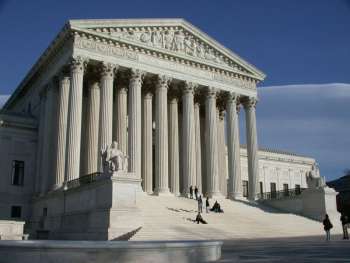The U.S. Supreme Court has agreed to hear two cases that challenge a new rule, included in the Affordable Care Act, which requires companies to cover birth control in employee health insurance plans.
Sebelius v. Hobby Lobby Stores and Conestoga Wood Specialties v. Sebelius will be combined into one hearing and will likely be argued before the court next March.
In the Hobby Lobby suit, the arts-and-crafts retail chain is arguing against the requirement that companies with more than 50 workers must provide health care plans that pay for most forms of contraception, as well as other preventative care. The law exempts most religious nonprofit organizations, but not for-profit companies.
As of 2012, the Oklahoma City-based company operates more 524 stores in 42 states with 22,000 employees. Annual revenues total $3 billion, putting Hobby Lobby at #147 on Forbes Magazine’s list of America’s largest private companies.
Politico reported Tuesday that the Justices will likely consider “whether a for-profit, secular corporation can claim constitutional protection from the [ACA] provision based on religious grounds.” There may be precedent for the court to rule in Hobby Lobby’s favor: A 1993 law, the Religious Freedom Restoration Act, forbids government from forcing a business to offer birth control in its employee health plans if the company’s owners claim a religious conflict. In addition, the U.S. Court of Appeals for the 10th Circuit ruled in favor of Hobby Lobby earlier this year, citing the Citizens United case in which the Supreme Court gave free speech protections to companies.
Founded by David Green, who remains CEO, in 1972, Hobby Lobby’s management has always blended its Christian beliefs into the day-to-day operations of the company. Its website states its mission is to “[honor] the Lord in all we do by operating the company in a manner consistent with biblical principles; serv[e] our employees and their families by establishing a work environment and company policies that build character, strengthen individuals and nurture families; and provid[e] a return on the owner’s investment, sharing the Lord’s blessings with our employees, and investing in our community.”
Green released a statement Tuesday. “My family and I are encouraged that the U.S. Supreme Court has agreed to decide our case. This legal challenge has always remained about one thing and one thing only: the right of our family businesses to live out our sincere and deeply held religious convictions as guaranteed by the law and the Constitution. Business owners should not have to choose between violating their faith and violating the law.” Hobby Lobby said the ACA’s requirement to “provide potentially life-terminated drugs and devices in insurance plans” violates the company’s “religious freedoms.”
The company does provide some types of contraceptive care to employees in their insurance plans, but objects to morning-after methods, which prevent a potentially fertilized egg from implanting in a woman’s uterus.
In the second case, Conestoga Wood Specialties v. Sebelius, a Mennonite-owned furniture company based in Pennsylvania is challenging the same ACA provision. “The cost of religious freedom for [Conestoga Wood Specialties owners] the Hahn family and many other job creators across the country who face this mandate is severe,” said Senior Legal Counsel Matt Bowman of Alliance Defending Freedom, the Christian law firm representing the company. “A family should not face massive fines and lawsuits just because they want to earn a living consistent with their faith.”
The Obama administration has made access to quality women’s health care a central pillar of the Affordable Care Act. The Justice Department plans to argue that the ACA’s contraception mandate does not place an undue burden on individuals’ religious freedom; rather, the government has an overriding interest in preventative care for women and children, according to Politico.
In a statement released Tuesday, Obama press secretary Jay Carney said, “The health care law puts women and families in control of their health care by covering vital preventive care, like cancer screenings and birth control, free of charge. Earlier this year, the Obama Administration asked the Supreme Court to consider a legal challenge to the health care law’s requirement that for-profit corporations include birth control coverage in insurance available to their employees. We believe this requirement is lawful and essential to women’s health and are confident the Supreme Court will agree.
“The President believes that no one, including the government or for-profit corporations, should be able to dictate those decisions to women,” he added.
Civil liberties and social justice groups are watching the case closely. “Everyone has a right to their religious beliefs, but religious freedom does not include the right to impose your beliefs on others,” said Louise Melling, deputy legal director of the ACLU. “It does not mean that businesses can refuse to comply with the law based on their religious beliefs, particularly where that means discriminating against their employees.”
The groups are concerned that, if the Supreme Court rules in favor of Hobby Lobby, companies could use the precedent to ignore portions of worker-protection laws they don’t like. For example, a company could refuse to offer health coverage for same-sex partners of employees, to cover mental health care or certain medical procedures, or to pay men and women equally.


What Do You Think?